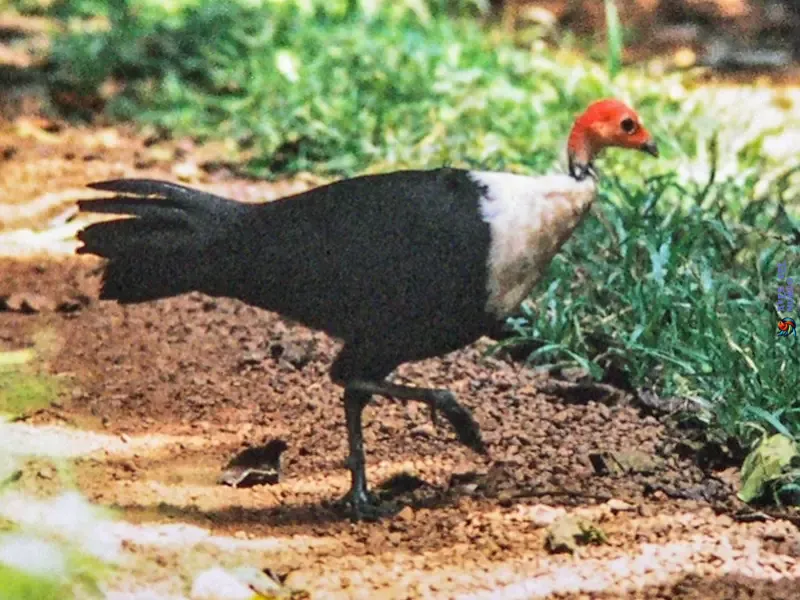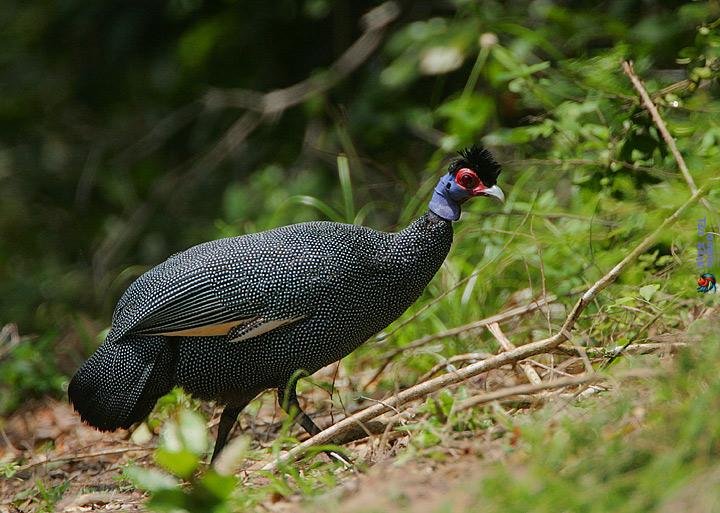Did you know that guinea fowl can be excellent companions for your backyard? Not only are they entertaining and sociable, but they also provide valuable services like bug control and garden bed protection. However, caring for guinea fowl requires proper feeding and housing to ensure their well-being.
In this comprehensive guide, we will provide you with essential tips for caring for guinea fowl, including their feeding requirements, housing needs, and how to create an optimal environment for them to thrive in your backyard.
Numida

The helmeted guineafowl (Numida meleagris) is the best known of the guineafowlbird family, Numididae, and the only member of the genus Numida. It is native to Africa, mainly south of the Sahara, and has been widely introduced, as a domesticated species, into the West Indies, North America, Colombia, Brazil, Australia and Europe.
Agelastes

Agelastes is a small genus of birds in the guineafowl family. It comprises two species:
White-breasted guineafowl
Black guineafowl
Acryllium

The vulturine guineafowl (Acryllium vulturinum) is the largest extant species of guineafowl. Systematically, it is only distantly related to other guineafowl genera. Its closest living relative, the white breasted guineafowl, Agelastes meleagrides inhabit primary forests in Central Africa. It is a member of the bird family Numididae, and is the only member of the genus Acryllium. It is a resident breeder in northeast Africa, from southern Ethiopia through Kenya and just into northern Tanzania.
Guttera

The plumed guineafowl (Guttera plumifera) is a member of the guineafowl bird family. It is found in humid primary forest in Central Africa. It resembles some subspecies of the crested guineafowl, but has a straighter (not curled) and higher crest, and a relatively long wattle on either side of the bill. The bare skin on the face and neck is entirely dull grey-blue in the western nominate subspecies, while there are a few orange patches among the grey-blue in the eastern subspecies schubotzi.
Key Takeaways
- Guinea fowl can be valuable companions for your backyard, providing bug control and garden bed protection.
- Proper feeding and housing are essential for the well-being of guinea fowl.
- This guide will provide you with tips on feeding, housing, and creating an optimal environment for your guinea fowl.
- Guinea fowl care requires attention to their unique needs and behaviors.
- By following these care guidelines, you can ensure the health and happiness of your guinea fowl flock.
Raising Guinea Fowl
Raising guinea fowl can be a unique and rewarding experience. These fascinating birds come in different breeds, each with its own distinctive characteristics. Some popular guinea fowl breeds include the Pearl, White, Royal Purple, and Lavender varieties. Whether you’re raising guinea fowl for their pest-control abilities, their beautiful feathers, or their entertaining personalities, this section will provide you with essential care tips to help you successfully raise these remarkable birds.
The Importance of Guinea Keet Care
When starting your journey with guinea fowl, it’s crucial to understand the special care required for guinea keets, which are baby guinea fowl. These delicate creatures need adequate warmth, proper nutrition, and a secure environment to grow into healthy adults. By providing them with a suitable brooder, a balanced diet, and protection from predators, you can give your guinea keets a strong start in life.
Socialization and Flock Integration
Socialization is key when raising guinea fowl. These social birds thrive in a flock environment and should be introduced to other guinea fowl or poultry gradually. Allowing them to interact with other birds from a young age will help them develop social bonds and establish a harmonious hierarchy within the flock. By providing enough space and suitable socialization opportunities, you can promote a cohesive and well-adjusted guinea fowl community.
The Challenges of Raising Guinea Fowl
Raising guinea fowl comes with its unique set of challenges. Compared to other poultry, guinea fowl are known for their high energy levels, strong flight capabilities, and vocal nature. They have different behavior patterns and tendencies, which may require specific accommodations. Additionally, their vulnerability to certain diseases, such as keet mortality syndrome, should be taken into consideration. Understanding and addressing these challenges will contribute to a successful and gratifying guinea fowl farming experience.
«Raising guinea fowl is an adventure like no other. From caring for tiny guinea keets to witnessing their quirky behaviors and distinct personalities, it’s a rewarding endeavor for any poultry enthusiast.» – [Your Name]
| Breed | Appearance | Behavior |
|---|---|---|
| Pearl | Distinctive pearl-like feathers | Lively and gregarious |
| White | White plumage with blue eyes | Gentle and calm |
| Royal Purple | Dark purple feathers with white spots | Active and vigilant |
| Lavender | Lavender gray coloring | Curious and independent |
By following these care tips and understanding the unique characteristics of different guinea fowl breeds, you can create a thriving environment for your flock. Raising guinea fowl is not only a practical endeavor but also a journey filled with fascination and joy.
Pros and Cons of Keeping Guinea Fowl
Keeping guinea fowl can be a rewarding addition to your backyard, but it’s important to consider both the advantages and disadvantages before making a decision. Let’s explore the pros and cons of keeping guinea fowl.
Advantages of Keeping Guinea Fowl
- Excellent Bug Control: Guinea fowl are natural foragers and excel at controlling pests and bugs in your yard. They can help reduce populations of ticks, mosquitoes, grasshoppers, and other unwanted insects.
- Effective Watchdogs: Guinea fowl are known for their loud and piercing calls, which serve as an alarm system. They can alert you to potential intruders or predators, helping to enhance the security of your property.
- Less Garden Bed Damage: Unlike chickens, guinea fowl are generally less destructive to garden beds. Their slender feet and beaks cause minimal damage to plants, making them a better choice if you’re concerned about preserving your garden.
Disadvantages of Keeping Guinea Fowl
- Noisy Nature: Guinea fowl are notoriously noisy birds. They have a distinct and loud vocalization, which can be disruptive to your peace and quiet, especially in densely populated areas or if you have close neighbors.
- Space Requirements: Guinea fowl require ample space to move around and thrive. They have a strong instinct to free-range and explore their surroundings, making them unsuitable for smaller backyards or urban environments.
- Challenges in Containment: Guinea fowl can be challenging to contain within a specific area without proper fencing. They have a tendency to wander off and can fly to higher perches, making it necessary to provide adequate barriers to keep them safe.
Overall, the pros of keeping guinea fowl include their bug control capabilities, their role as effective watchdogs, and their minimal damage to garden beds. However, their noisy nature, space requirements, and containment challenges should be carefully considered.
It’s important to weigh the pros and cons of keeping guinea fowl to determine if they are the right fit for your backyard ecosystem. Now that we’ve explored the advantages and disadvantages, let’s move on to the next section to discuss the space and free-ranging requirements for guinea fowl.
Space and Free-Ranging Requirements
Guinea fowl require large areas to be happy and healthy. These birds have a natural instinct to free-range and explore their surroundings, which is essential for their well-being. Providing enough space for guinea fowl to roam is crucial to their overall health.
Unlike some other poultry, guinea fowl are not content with confined spaces. They thrive when they have access to large areas where they can freely move, forage, and engage in their natural behaviors.
«Guinea fowl are known for their active and curious nature. They love to explore and investigate their surroundings. Giving them ample space to roam is essential for their physical and mental enrichment.»
Benefits of Free-Ranging
Allowing guinea fowl to free-range in large areas offers several benefits:
- Promotes natural behavior: Free-ranging allows guinea fowl to exhibit their natural foraging, dust bathing, and socializing behaviors.
- Improved health: The freedom to move and explore helps to keep guinea fowl physically active, reducing the risk of obesity and health problems.
- Bug control: Guinea fowl are excellent at controlling pests and insects naturally. They help to keep the population of ticks, grasshoppers, and other unwanted creatures in check.
- Stress reduction: Free-ranging provides guinea fowl with mental stimulation and reduces stress levels, resulting in happier and healthier birds.
Creating a Safe and Secure Environment
While giving guinea fowl the freedom to free-range is important, it’s equally vital to create a safe and secure environment for them. Here are a few essential tips:
- Perimeter fencing: Erect a sturdy and predator-proof fence around the free-ranging area to prevent guinea fowl from wandering off and to keep potential predators out.
- Shelter and roosting spots: Provide appropriate shelter options, such as trees, shrubs, or guinea fowl houses, where they can find protection from the elements and roost comfortably.
- Natural hiding spots: Incorporate natural hiding spots, such as bushes or long grass, to give guinea fowl a sense of security and protection.
By ensuring guinea fowl have a spacious area to free-range and implementing necessary safety measures, you can create an environment that allows these birds to thrive and exhibit their natural behaviors.
Housing and Nesting
Providing the right housing and nesting options is crucial for the well-being of your guinea fowl. These birds need a safe and comfortable shelter to protect them from the elements and predators. In this section, we will explore different types of housing options that can meet the specific needs of guinea fowl, as well as discuss the importance of roosting poles and the challenges of providing nesting boxes.
Types of Housing for Guinea Fowl
Guinea fowl require housing that offers adequate space, ventilation, and protection. Here are some common housing options to consider:
- Traditional coop: A traditional chicken coop can be modified to accommodate guinea fowl. Ensure proper ventilation and enough space for the birds to move around.
- Guinea fowl house: A dedicated guinea fowl house can be custom-built to meet their specific needs. It should have a spacious interior, sturdy construction, and predator-proof features.
- Converted shed: A converted shed can provide a convenient and secure housing option for guinea fowl. Make sure to add windows or vents for proper airflow.
Regardless of the housing option you choose, it is important to provide a clean and dry environment for your guinea fowl. Regular cleaning and maintenance are essential to prevent the buildup of waste and to minimize the risk of disease.
The Role of Roosting Poles
Guinea fowl are perching birds, and they enjoy roosting on elevated platforms. Roosting poles provide a sense of security for guinea fowl and allow them to rest comfortably. These poles can be installed in the housing area, positioning them at a height that guinea fowl can easily access. Ensure that the poles are sturdy and provide enough space for all the birds in your flock.
Challenges of Providing Nesting Boxes
Unlike chickens, guinea fowl do not typically use nesting boxes for egg laying. Instead, they prefer to create shallow ground nests hidden in shrubs or tall grass. This natural behavior can make it challenging to provide suitable nesting options for guinea fowl. However, you can create nesting areas by providing secluded spots or piles of straw and vegetation. These areas should be kept clean and undisturbed to encourage guinea fowl to lay their eggs there.
Remember, guinea fowl are excellent at finding their own shelter and nesting spots, but it’s important to provide them with suitable options to ensure their comfort and well-being.
Egg Laying
Guinea fowl are fascinating birds known for their unique egg-laying habits. Understanding their nesting behavior and effectively collecting their eggs is essential for any guinea fowl owner. Guinea fowl are communal layers, meaning they often lay their eggs together in the same nest. Rather than each hen having her own individual nest, they prefer to share a communal nesting area until there are enough eggs to incubate.
During the egg-laying season, which typically occurs in the spring and summer months, guinea fowl hens will lay their eggs in a designated nesting spot. These nesting habits are deeply ingrained in their natural behavior, and it is important to provide suitable nesting options to accommodate their communal nature.
To effectively collect guinea fowl eggs, it is recommended to check the nesting area regularly. Guinea fowl eggs are slightly smaller than chicken eggs and have a unique speckled shell, making them easily distinguishable. When collecting the eggs, it is important to handle them gently to avoid any cracks or damage.
«Guinea fowl are communal layers, meaning they often lay their eggs together in the same nest.»
Here are some key points to keep in mind for guinea fowl egg collection:
- Check the nesting area daily to collect fresh eggs.
- Handle the eggs gently to avoid cracks or damage.
- Provide clean and suitable nesting materials to encourage proper egg-laying behavior.
- Consider using nesting boxes to provide a designated space for the communal nesting.
Egg collection plays a crucial role in ensuring the freshness and quality of guinea fowl eggs. These nutritious eggs can be enjoyed as a culinary delight or even incubated for hatching new guinea keets.
Egg Laying Habits
Guinea fowl hens typically lay their eggs in the morning hours, and the laying pattern may vary depending on the breed and individual bird. While some guinea fowl hens may lay their eggs consistently every day, others may lay them every other day or every few days.
It is important to note that guinea fowl may become broody, meaning they develop an instinct to incubate their eggs. When a guinea hen becomes broody, she will diligently sit on the eggs to keep them warm and encourage hatching. If you plan to incubate the eggs, it is best to let the guinea hen complete her brooding process. However, if you intend to collect the eggs for consumption or to prevent breeding, it is recommended to remove the eggs daily to discourage broodiness.
In Summary
Guinea fowl are communal layers with unique egg-laying habits. Providing suitable nesting options, regularly checking the nesting area, and gently handling the eggs are key to effective egg collection. Whether you enjoy guinea fowl eggs as a culinary delicacy or for incubating new guinea keets, understanding their egg-laying behavior is essential for successful guinea fowl care.
Health and Wellness
Ensuring the health and wellness of your guinea fowl is crucial for their overall well-being. Proper care and attention can help prevent common diseases and ensure they thrive in their environment. Vaccination plays a vital role in protecting your guinea fowl from infectious diseases. Consult with a veterinarian to determine the appropriate vaccination schedule for your flock.
Climate adaptation is another important aspect to consider when caring for guinea fowl. These birds are resilient but may require additional measures during extreme weather conditions. Provide shelter and adequate ventilation to protect them from extreme heat or cold. Additionally, ensure access to fresh water at all times to keep them hydrated.
The guinea fowl diet is a key factor in maintaining their health and wellness. These birds are known for their bug-control abilities, but a balanced diet is essential for their nutritional needs. A diet consisting of high-quality poultry feed supplemented with fresh greens and insects will help keep your guinea fowl in optimal condition. Provide access to grit for proper digestion and consider incorporating a calcium source, such as crushed oyster shell, for egg production.
Regular health checks are recommended to monitor the well-being of your guinea fowl. Look for signs of illness or abnormal behavior, and promptly consult a veterinarian if any concerns arise. By prioritizing their health and wellness, you can ensure that your guinea fowl lead healthy and fulfilling lives in your care.